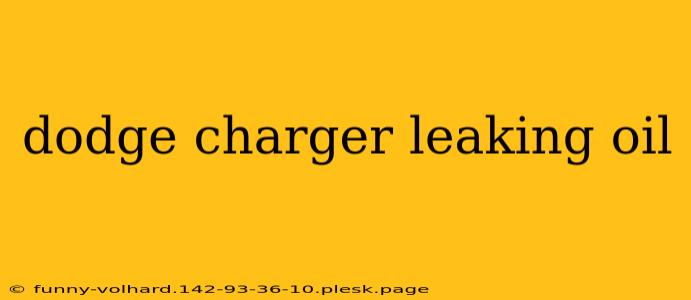A leaking Dodge Charger can be a frustrating and potentially costly problem. This comprehensive guide will walk you through identifying the source of the leak, understanding the potential causes, and exploring effective solutions. We'll cover everything from minor drips to major spills, helping you diagnose the issue and decide whether DIY repair is feasible or if professional help is needed.
Identifying the Source of the Oil Leak
Before diving into potential causes, accurately pinpointing the leak's origin is crucial. Here's a step-by-step approach:
-
Park on a Clean Surface: Drive your Charger onto a clean, dry surface like concrete or a driveway. This makes it easier to spot oil stains.
-
Inspect Visually: Carefully examine the underside of your engine and transmission. Look for fresh oil stains, drips, or pools. Pay close attention to common leak points:
- Oil Filter: A loose or damaged oil filter is a frequent culprit.
- Drain Plug: A stripped or loose drain plug is another common source of leaks.
- Valve Cover Gaskets: These gaskets can deteriorate over time, leading to leaks.
- Oil Pan Gasket: Similar to valve cover gaskets, a damaged oil pan gasket can cause significant oil loss.
- Crankshaft Seal: Leaks from the crankshaft seal often appear near the front of the engine.
- Camshaft Seal: Similar to the crankshaft seal, a damaged camshaft seal can lead to oil leaks.
-
Check the Oil Level: After inspecting for leaks, check your oil level using the dipstick. Low oil levels confirm a leak is present and indicate the severity.
Common Causes of Oil Leaks in Dodge Chargers
Several factors can contribute to oil leaks in Dodge Chargers. Understanding these causes can help you determine the best course of action:
1. Worn or Damaged Gaskets and Seals:
- Age and Wear: Over time, gaskets and seals naturally degrade due to heat, vibration, and exposure to oil. This is a common cause, particularly in older Chargers.
- Improper Installation: Incorrect installation during previous repairs can lead to premature gasket and seal failure.
2. Loose or Damaged Oil Filter:
- Over-tightening: Excessive tightening can damage the filter and cause leaks.
- Poor-quality Filter: Using a low-quality oil filter can compromise its sealing capabilities.
3. Damaged Oil Pan:
- Impact Damage: A damaged oil pan from an accident or road debris can cause oil leaks.
- Corrosion: Rust and corrosion can weaken the oil pan, leading to cracks or leaks.
4. Other Potential Causes:
- Cracked Engine Block or Head: While less common, significant engine damage can result in oil leaks. This often requires major repairs.
- Transmission Leaks: While not directly related to engine oil, transmission fluid leaks can sometimes be mistaken for oil leaks.
Solutions for Dodge Charger Oil Leaks
The best solution depends on the source and severity of the leak:
- Minor Leaks (e.g., slightly loose oil filter): Tightening the oil filter or drain plug might suffice. However, always ensure proper torque to avoid damage.
- Moderate Leaks (e.g., damaged gasket): Replacing the damaged gasket may be a DIY project for mechanically inclined individuals. Consult your owner's manual or a repair manual for specific instructions.
- Major Leaks (e.g., cracked oil pan, damaged engine block): These issues typically require professional repair by a qualified mechanic.
When to Seek Professional Help
If you're uncomfortable working on your car, or if the leak is significant or you're unsure of the cause, seeking professional help is crucial. A mechanic can accurately diagnose the problem and perform the necessary repairs. Ignoring a major oil leak can cause serious engine damage.
This guide provides a general overview. Always consult your owner's manual for specific information regarding your Dodge Charger model and year. Remember, regular oil changes and maintenance are key to preventing oil leaks and ensuring your engine's longevity.

